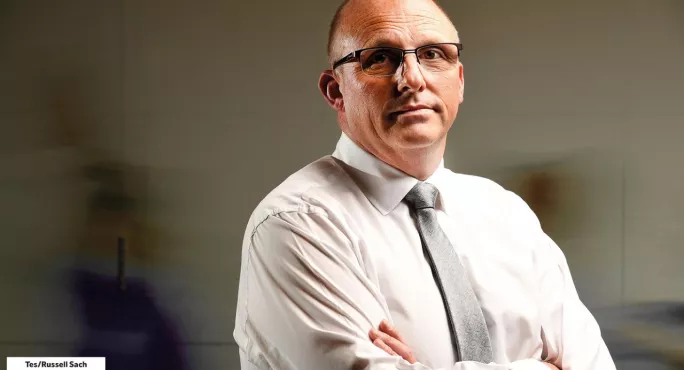Exclusive: Schools ‘need record cash in perilous times’

The government needs to push school spending to its highest ever level to help the country through a “perilous period in history”, a headteacher’s leader has said.
Paul Whiteman, general secretary of the NAHT school leaders’ union, told Tes that ministers needed to provide schools with funding above the highest level seen previously, which was in 2010.
The union leader highlighted increasing deprivation and mental health needs and the funding crisis for pupils with special educational needs and disabilities (SEND) as reasons why a major step change in funding is needed.
And he warned that Covid, Brexit and climate change mean the country is facing a “perilous” moment that it needs to equip younger generations to face.
Mr Whiteman said that while Covid catch-up was a short-term priority, the country also needed a longer-term ambition for the role of education in its wider recovery.
Warning: One in five schools facing significant cuts
Research: Covid boost won’t restore school funding to 2009 levels
Background: Government announces funding boost
In an interview with Tes, he said: “We are getting lost in a debate about recovery. Covid recovery should be our short-term ambition but we also need to be talking about a much more longer-term and substantial ambition for education going forward.
Call for record school funding to help Covid recovery
“The country’s suffered a shock the like of which we haven’t seen since the end of the Second World War
“And that presents us with a unique moment to be able to think about what it is we need, in terms of determining what schools are for, what education is for and to fund the system we want rather than to keep looking back to the past.”
Mr Whiteman said he has talked about 2010 spending levels to highlight the drop in real-terms funding in schools over the past decade .
But he is now calling for the government to not just return to this level but to go beyond it.
“I use the reference to funding levels in 2010 as a comparative point, and that’s useful, as it gives us a measure of how much the country, or the government, is prepared to invest in schools comparatively to over a decade ago.
“But that doesn’t actually tell us much about what we really need in an increasingly complex and competitive world in which the UK increasingly stands alone.”
“Simple looking back is too narrow. If you look at the increasing needs in mental health, the crisis in SEND funding, the increase in deprivation, it is clear that more is going to be needed to meet the government pronouncements about levelling up.
“We need to have those discussions about funding that surpasses what we had in 2010 and really pushes education to the centre of the government and of the country’s recovery, not just from Covid but everything else that is hitting us right now.
‘We are at a perilous point in history’
“We are at a perilous point in history, I think we’ve got to make a success of Brexit - that isn’t taking off as fast as perhaps people would have wanted - but whether you voted for it or not, it’s here. And we’ve got to make a success of that and we’re looking to the younger generations coming through to really build upon that.
“We’ve got massive climate change issues. We’ve got massive equality debates going on at the moment, and young people are very vocal on these issues.
“We have a moment here where we can choose to seize the agenda around education to equip the next generation coming through, to deal with all of these problems and challenges that they’re going to face.”
Analysis published earlier this month showed that core school spending per pupil in England will remain lower in real terms than it was in 2009-10, despite the government’s recent funding boost.
Total school spending per pupil in England was just over £6,500 per pupil in 2019-20, which is 9 per cent lower in real terms than its high point of £7,200 in 2009-10, according to Institute for Fiscal Studies analysis.
The government has allocated an extra £7.1 billion for schools in England through to 2022-23, which will increase spending per pupil by over 8 per cent, but school spending per pupil in 2022-23 will still be around 1-2 per cent lower in real terms than in it was 2009-10 despite the funding allocation, the analysis suggests.
Luke Sibieta, a research fellow with the Institute for Fiscal Studies and the Education Policy Institute, said that the per pupil spending in 2010 was the highest level of school funding on record to date.
You need a Tes subscription to read this article
Subscribe now to read this article and get other subscriber-only content:
- Unlimited access to all Tes magazine content
- Exclusive subscriber-only stories
- Award-winning email newsletters
Already a subscriber? Log in
You need a subscription to read this article
Subscribe now to read this article and get other subscriber-only content, including:
- Unlimited access to all Tes magazine content
- Exclusive subscriber-only stories
- Award-winning email newsletters



